by Lisa Cooke | Mar 24, 2017 | 01 What's New, German, Records & databases
Are you researching German genealogy in the States? If so, you will love what we’ve dug up. German death lists are just the start. Also in this week’s new and updated genealogical record collections, Irish Quaker records, UK pensioners records, and a new product support announcement for Family Tree Maker software.
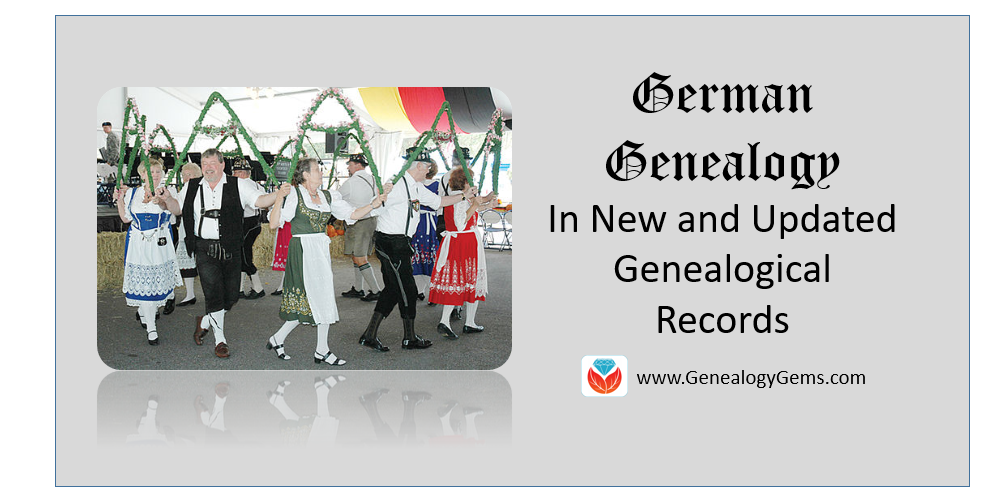
By Photos by Donna Hyatt (United States Army) [Public domain], via Wikimedia Commons.
German Genealogy in the States – Kentucky
You may not realize there was a large German population in Louisville, Kentucky, here in the United States. Our Book Club Guru, Sunny Morton, brought a new found website to our attention called German Genealogy Group. Among many other things, the German Genealogy Group has recently added newspaper death listings from the Louisville Anzeiger, a German newspaper from the Louisville, Kentucky area, to their website. The years covered are 1849-1865. Though only an index, the information provided will help you locate the newspaper itself.
Ireland – Quaker Birth Records
With over 302,000 new birth records from all over Ireland, you may finally find your Irish Quaker ancestors birth information. Ireland, Society of Friends (Quaker) births collection may help you uncover generations of your family tree. The amount of information listed on a birth record in this collection will vary, but most will include the child’s name, birth date, birth place, parish, and address. Most will also contain the parents’ names, addresses, and occupations.
Ireland – Quaker Marriage Records
Also at Findmypast, a collection titled Ireland, Society of Friends (Quaker) marriages has been updated. In fact, there have been over 20,000 new additions. These records will likely include data such as an occupation, parents’ names, and who attended the ceremony. As well as the names, address and marriage details of the newlyweds, parents’ names, an attendee list including names and dates of birth, and even details of the meeting may be found.
Ireland – Quaker Death & Congregational Records

By Holmes after Honthorst in 1654 [Public domain], via Wikimedia Commons. George Fox, Quaker founder.
Findmypast collection, Ireland, Society of Friends (Quaker) congregational records offers a wealth of knowledge about the role your ancestor might have played within the Quaker community. An additional 250,000 Irish congregational records have been added. Details of meetings and activities are just a sampling of what you will find. These records include a transcript as well as an image of the original handwritten record.
Ireland – Quaker School Records
Over 9,000 new records have been added to the Findmypast collection titled Ireland, Society of Friends (Quaker) school records. This collection covers six different schools and dates back as far as the 1700s. The records are compiled from various Quaker school registers and lists. Each entry includes both a transcript and an image of the original document. Details contained in each record will vary, but most will list the pupils name, age at last birthday, school and department, admission year, leaving year, parents’ names, and their occupations.
British Newspaper Archive Announcement
The British Newspaper Archive has recently announced a major new milestone in their project to digitize up to 40 million newspaper pages from the British Library’s vast collection of historic British & Irish newspapers. Following the addition of a newspaper for the country’s smallest county, Rutland, the Archive now covers at least one title from each of the country’s 48 counties and is now available to search and explore.
As part of this push to improve the British Newspaper Archive experience, a new “In Pictures” feature has also been added.
The British Newspaper Archive now contains over 18.7 million pages from 747 titles from England, Wales, Scotland, and Ireland and spans nearly 300 (1709-2003) years.
United Kingdom – Chelsea – Pensioner Service Records
Fold3.com has a collection titled UK, Royal Hospital Chelsea Pensioner Soldier Service Records. This collection includes those who would have been eligible to receive a pension from the British Army between 1760-1920.

The collection contains records for British soldiers (not officers) who received a pension from the British Army. They typically do not include records for soldiers who died in service or who were discharged early and did not receive a pension.
Some records contain more information than others, and pension documents after 1883 typically have more details regarding the soldier such as, information about next of kin, details of marriage, and children. Common details may include age, birthplace, service details (including any decorations,) physical description, previous occupation on enlistment, and the reason for discharge to pension. Documents that are most common include:
On Fold3, the records in this collection are organized as such:
- For the period 1760-1872, the documents are arranged alphabetically by name within regiment, including militia to 1854.
- From 1873-1882, the documents are arranged alphabetically under cavalry, artillery, infantry and corps.
- From 1883-1913, two alphabetical sequences for the entire army for discharge papers are arranged by range of surname and date 1883-1900 and 1900-1913.
United Kingdom – Leeds – Cemetery Burial Registers
Not everything is on the Genealogy Giants (meaning Ancestry, Findmypast, FamilySearch, or MyHeritage.) The Leeds General Cemetery Burial Registers Index is free and available to search online. This database of transcriptions covers all entries in the burial registers of the Leeds General Cemetery and covers the years of 1835-1992. There are 97,146 entries in the index. Digital images of the registers are available to view alongside the transcribed data.

Search by surname of deceased or surname of the parents. Information found on the record will vary, but you are likely to find the name of the deceased, date of death, age at death, parents names, occupation, and cause of death. This is a great resource if you have been having trouble finding a civil death record.
United Kingdom – Sheffield
If you had ancestors who lived in the Sheffield area, you will find this next website a great help to your research. The Sheffield Indexers website provides full, online, searchable indexes to numerous collections, for free. These collections include, but are not limited to:
- 1841 Sheffield Census
- Cemetery records
- Burial records
- School records
- Directories
Be sure to check out their extensive indexes!
Family Tree Maker Announcement
Last year, Ancestry.com announced the purchase of Family Tree Maker desktop software by Software MacKiev. Their goal has always been to maintain the capability to share your family tree data between files on your computer and your personal Ancestry online trees. They’ve been working on a new Ancestry gateway with Software MacKiev to use in their Family Tree Maker 2017, which will be available soon.
What you should know (hat tip: Ancestry.com):
- TreeSync will be replaced by Software MacKiev’s FamilySync™. In the new FamilySync, Ancestry’s search, merge, and Ancestry hints will all work as they do now for users who sync with their Ancestry trees.
- FamilySync will be available only in Software MacKiev’s Family Tree Maker 2017 edition, which will be released on March 31, 2017.
- The upgrade is free for all users who purchased a copy of a MacKiev Family Tree Maker edition since March 1, 2016. Those with previous Ancestry editions, or who got a free copy of Family Tree Maker 2014.1 or Mac 3.1, are eligible for discounted upgrades. The pre-order upgrade is $29.95 for those who sign up for Software MacKiev’s mailing list before March 29 and the upgrade will continue to be a discounted price ($39.95) for a limited time after March 29.
- Between Wednesday, March 29 and Friday, March 31, there will be a short period where syncing functionality may be interrupted as Software MacKiev rolls out their new syncing technology.
- As of March 29, 2017, Ancestry will no longer be supporting TreeSync, given the introduction of Software MacKiev’s FamilySync™. Software MacKiev will continue to handle all related customer questions for Family Tree Maker. Visit Software MacKiev’s Family Tree Maker Support Center at support.familytreemaker.com if you have questions.
More on German Genealogy in the States
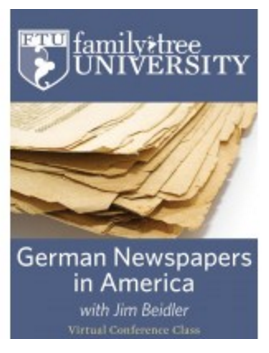 German Newspapers in America is a virtual conference OnDemand video class by Jim Beidler. Stateside ethnic newspapers are a revealing resource for those searching their German ancestors. In this video you’ll learn:
German Newspapers in America is a virtual conference OnDemand video class by Jim Beidler. Stateside ethnic newspapers are a revealing resource for those searching their German ancestors. In this video you’ll learn:
-
- How newspapers are helpful for your genealogy
- The special role of German-language newspapers
- Special concerns such as fonts
- How to access German language newspapers
by Lisa Cooke | May 3, 2014 | 01 What's New, Brick Wall, Google, Inspiration
Cold Case files are as common in genealogy as they are in criminal investigations. So it seemed a no brainer to me that family historians could 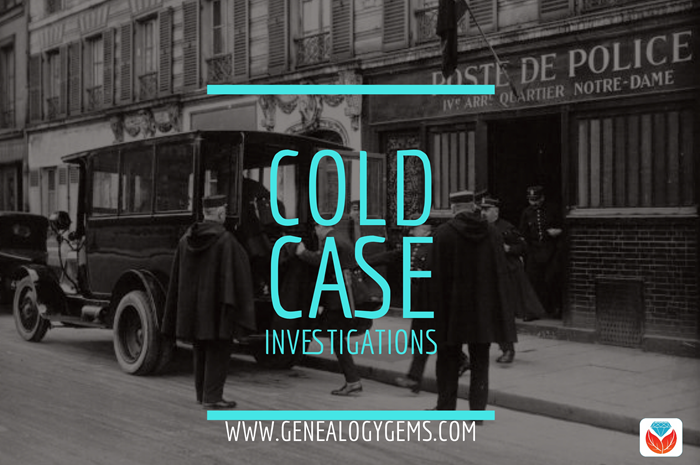 incorporate some of the same techniques that cold case investigators use. And that is how my presentation How to Reopen and Work a Genealogical Cold Case was born.
incorporate some of the same techniques that cold case investigators use. And that is how my presentation How to Reopen and Work a Genealogical Cold Case was born.
I recently brought this exciting hour to the folks at the Williamson County Texas Genealogical Society and they embraced it with open arms. Eyes were lighting up, and there was excitement in the air at the prospect of pulling some of those dusty old brick walls off their genealogical office shelves. I warned the group that they would be blaming for a sleepless night that night as they burned the midnight oil putting the tips to work. And as always, I encourage them to let me in on their successes by dropping me an email. I never cease to be amazed at what my wonderful audiences accomplishes!
An email from Teresa Hankins of Round Rock, TX landed in my inbox the very next morning, and her message was inspiring:
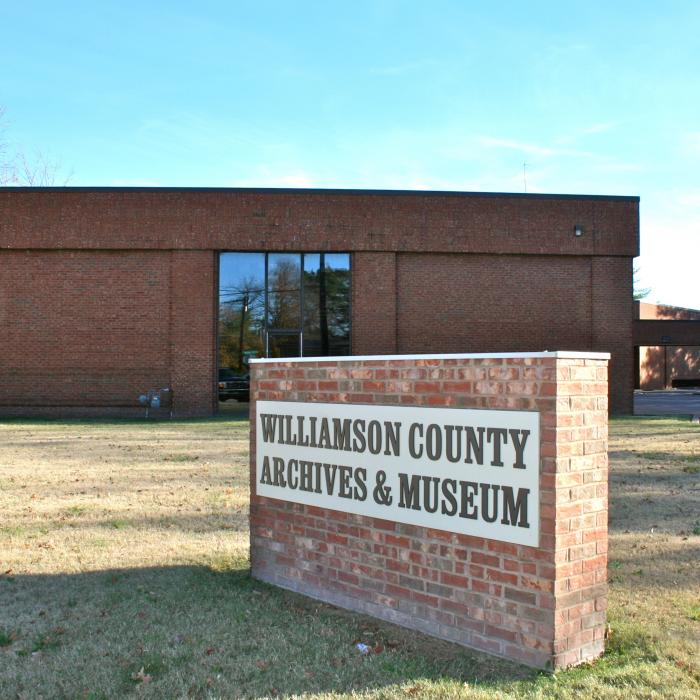 “I attended your lecture on Genealogical Cold Cases at the Williamson County Genealogical Society’s meeting just last night. It was late when I got home, but I wanted to check out some of your suggestions on cracking hard cases. I was particularly interested in Google Books, as I had just recently discovered it, but hadn’t used it much.
“I attended your lecture on Genealogical Cold Cases at the Williamson County Genealogical Society’s meeting just last night. It was late when I got home, but I wanted to check out some of your suggestions on cracking hard cases. I was particularly interested in Google Books, as I had just recently discovered it, but hadn’t used it much.
The Case: My 2nd great-grandfather, Joshua, was too young to serve in American Civil War, but he had nine brothers who did serve. These brothers are what first prompted my interest in genealogy, and I’ve spent untold hours reconstructing their movements and histories.
One of the most poignant stories is that of David, the youngest of the nine. He couldn’t have been more than 17 years old when he joined the Union regiment. He was wounded at the Battle of Lone Jack, discharged, and then married Margaret, a young lady from a neighboring farm. They had one child, named Thomas, and then David was murdered by bushwhackers. His young bride remarried and had two more children before she, too, passed away at a young age. My unsolvable case was with Thomas, son of David and Margaret, who seemed to vanish from history. He lost his father when he was an infant, his mother when he was about 12, and I wanted to know what happened to him!
 Like all good genealogists, I was only going to research a little before going to bed. I wanted to play around on Google Books and see how the searches worked. I typed in a few key words that were unsuccessful before settling on a group of books based on Benton County, Missouri, which is where most of my ancestors in this line resided. I was just clicking on a book and searching for the surname, not looking for anything in particular. I only wanted to see what would come up and how the search engine worked. The next thing I know, I am looking at a record from the Supreme Court of Missouri, regarding some sort of land dispute. There are all the names involved, Thomas, his two half siblings, another family that I know are neighbors and relatives! I now know the month and year that Thomas died. I know that he sold some land one of his uncles. He was living there among family and friends, and though he, too, died young, at least I know what happened! This has opened up a cold case, and now it is on fire with new leads. I can’t wait to see what else I can dig up on Google Books!
Like all good genealogists, I was only going to research a little before going to bed. I wanted to play around on Google Books and see how the searches worked. I typed in a few key words that were unsuccessful before settling on a group of books based on Benton County, Missouri, which is where most of my ancestors in this line resided. I was just clicking on a book and searching for the surname, not looking for anything in particular. I only wanted to see what would come up and how the search engine worked. The next thing I know, I am looking at a record from the Supreme Court of Missouri, regarding some sort of land dispute. There are all the names involved, Thomas, his two half siblings, another family that I know are neighbors and relatives! I now know the month and year that Thomas died. I know that he sold some land one of his uncles. He was living there among family and friends, and though he, too, died young, at least I know what happened! This has opened up a cold case, and now it is on fire with new leads. I can’t wait to see what else I can dig up on Google Books!
Thank you for all the useful information you shared. I learned so much. I can’t wait to try out your other suggestions. You said to send you an email if we cracked a cold case, and that is what I’m doing. Have a blessed day!”
Well, I feel blessed every time I hear from my fabulous students / listeners / readers! I’m a lucky girl!
And I received one more blessing in Round Rock: At long last I finally got to meet my cousin Carolyn. You “met” Carolyn on the free Family History: Genealogy Made Easy podcast episodes about contacting living relatives (see below for links.) Carolyn and I have been collaborating online for nearly ten years on our family history (her mother is my Grandmother’s sister) but we never had the opportunity to meet in person until now. She’s as sweet and warm as she is on the phone – it’s not wonder she has such great success reaching out to family relations.
It’s wonderful to hear from folks about how they have benefited from something I’ve shared, but I could write volumes on the blessings I’ve received in this job that I love.
Heritage Quilts Video with Carolyn: featuring a quilt in our family. Each block features one of our female ancestors.
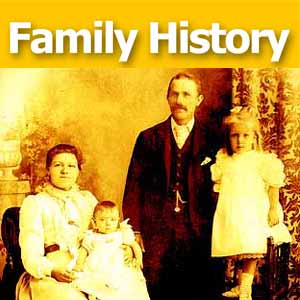 Episode 14: How to Contact Long-Lost Relatives
Episode 14: How to Contact Long-Lost Relatives
Connecting with someone who knows about our ancestors can really boost our research results—and even create new relationships among living kin. But it’s not always easy to send that first email or make that first call. In this episode, we chat with my cousin, Carolyn Ender, who has mastered the art of “genealogical cold calling” by conducting hundreds of telephone interviews. She has a knack for quickly connecting with folks she doesn’t know over the telephone in ways that put them at ease and bring to light the information that she’s looking for.
Episode 15: More Tips for Contacting Distant Relatives
In this episode we talk more about “genealogical cold calling” with my cousin, Carolyn Ender, who has conducted hundreds of telephone interviews. Relationships are key to genealogical success and by following 14 genealogical cold calling strategies you will find your research relationships multiplying.

A one hour video of Lisa’s class on Genealogical Cold Cases is part of Genealogy Gems Premium Membership. Click here to become a Member.
by Lisa Cooke | Jun 4, 2015 | 01 What's New, Family Reunions, Google, History, images, Newspaper, Technology, United States, Video
 It’s common to hear of long-lost relatives who rediscover each other online or through DNA tests. But nearly 100 years ago, another new technology–the radio–united a pair of long-lost siblings 40 years after one ran away.
It’s common to hear of long-lost relatives who rediscover each other online or through DNA tests. But nearly 100 years ago, another new technology–the radio–united a pair of long-lost siblings 40 years after one ran away.
This newspaper article reports that Alonso Jones’ children were sitting around one day in 1926 listening to the radio. Then they heard the announcer say, “Alonso Jones, wherever you are, listen…Your sister wants to see you at Worthington, Ohio. She has not seen or heard from you in forty years. You were born at Antiquity, Meigs County, Ohio, at the time of the Civil War….”
“You were reared by Captain William Roberts, an Ohio River flat boat man. You went with him on a produce boat when you were a boy and ran away while the boat was lying at the bank in Arkansas.” The article reports that the man telegraphed his sister and arranged to meet her. What a great story! And what a great family history find for anyone researching Alonso Jones or his sister, Mrs. Robert Eakin, or his guardian, William Roberts!

Salt Lake Tribune, January 1, 1926, p. 1. Digitized at Ancestry.com.
This article illustrates two fantastic tips for newspaper searching.
FIRST, I originally found this article in the Salt Lake Tribune, digitized at Ancestry. I was struck because the story was about people from Ohio and Arkansas–not Salt Lake. As we still see today, local news stories of the past were often reported in other cities. When searching digitized newspapers, don’t automatically discount search results that otherwise seem right but appear in out-of-town papers.
SECOND, curious about this story, I used Lisa’s search strategies from her book, The Genealogist’s Google Toolbox to search for more information about the people mentioned in the article. I got a hit on a possible match for the riverboat caption. I also found that the Google News Archive had this same article in The Evening Independent in St. Petersburg, Florida (shown above). The copy above is much clearer to read and slightly different. For these reasons, it can sometimes be worth looking for duplicates of news articles and/or obituaries for your relatives.
 Want to learn more? Genealogy Gems Premium members can also listen to Premium podcast episodes GGP 36 and 3GGP 37 about newspaper searching (Lisa talks about Google News Archive in episode 37). Or get the ultimate scoop in How to Find Your Family History in Newspapers! It’s packed with inspiring family history finds in the newspaper and all the tools you need (online and offline) for finding your own.
Want to learn more? Genealogy Gems Premium members can also listen to Premium podcast episodes GGP 36 and 3GGP 37 about newspaper searching (Lisa talks about Google News Archive in episode 37). Or get the ultimate scoop in How to Find Your Family History in Newspapers! It’s packed with inspiring family history finds in the newspaper and all the tools you need (online and offline) for finding your own.
by Lisa Cooke | Mar 6, 2014 | 01 What's New, Census, History, Kids

Remember the board game LIFE? Archives.com has put its own spin on this family favorite that experienced a revival in the 1960s.
(Quick Quiz: 1. What year was the game of LIFE created?
Bonus: 2. What was the original name?)
We recently discovered this cool, interactive webpage for learning more about U.S. history through census facts. It’s called The American Family Through Time and you can “play” it here free at Archives.com.
This clever page uses census data to show how American life has changed over the course of 220 years (and 23 censuses). You can click on decade-by-decade summaries on the “gameboard.” In addition to the census questions, you’ll find some fun now-and-then comparisons for housing, education and occupations. Great for kids of all ages!
Quick Quiz Answers:
1. 1860
2. The Checkered Game of Life




 German Newspapers in America is a virtual conference OnDemand video class by Jim Beidler. Stateside ethnic newspapers are a revealing resource for those searching their German ancestors. In this video you’ll learn:
German Newspapers in America is a virtual conference OnDemand video class by Jim Beidler. Stateside ethnic newspapers are a revealing resource for those searching their German ancestors. In this video you’ll learn:
 incorporate some of the same techniques that cold case investigators use. And that is how my presentation
incorporate some of the same techniques that cold case investigators use. And that is how my presentation  “I attended your lecture on Genealogical Cold Cases at the Williamson County Genealogical Society’s meeting just last night. It was late when I got home, but I wanted to check out some of your suggestions on cracking hard cases. I was particularly interested in Google Books, as I had just recently discovered it, but hadn’t used it much.
“I attended your lecture on Genealogical Cold Cases at the Williamson County Genealogical Society’s meeting just last night. It was late when I got home, but I wanted to check out some of your suggestions on cracking hard cases. I was particularly interested in Google Books, as I had just recently discovered it, but hadn’t used it much. Like all good genealogists, I was only going to research a little before going to bed. I wanted to play around on Google Books and see how the searches worked. I typed in a few key words that were unsuccessful before settling on a group of books based on Benton County, Missouri, which is where most of my ancestors in this line resided. I was just clicking on a book and searching for the surname, not looking for anything in particular. I only wanted to see what would come up and how the search engine worked. The next thing I know, I am looking at a record from the Supreme Court of Missouri, regarding some sort of land dispute. There are all the names involved, Thomas, his two half siblings, another family that I know are neighbors and relatives! I now know the month and year that Thomas died. I know that he sold some land one of his uncles. He was living there among family and friends, and though he, too, died young, at least I know what happened!
Like all good genealogists, I was only going to research a little before going to bed. I wanted to play around on Google Books and see how the searches worked. I typed in a few key words that were unsuccessful before settling on a group of books based on Benton County, Missouri, which is where most of my ancestors in this line resided. I was just clicking on a book and searching for the surname, not looking for anything in particular. I only wanted to see what would come up and how the search engine worked. The next thing I know, I am looking at a record from the Supreme Court of Missouri, regarding some sort of land dispute. There are all the names involved, Thomas, his two half siblings, another family that I know are neighbors and relatives! I now know the month and year that Thomas died. I know that he sold some land one of his uncles. He was living there among family and friends, and though he, too, died young, at least I know what happened! 




